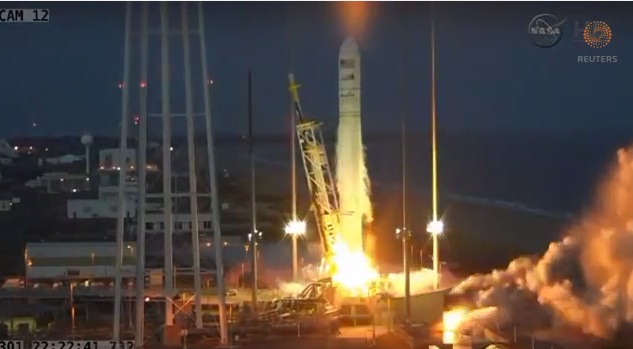Yesterday, at 6:22 p.m. EDT, the Antares rocket lifted off from the Wallops Flight Facility launch site in Virginia, destined for its third resupply mission to the International Space Station.
A few moments after liftoff, the rocket experienced a cataclysmic failure—crashing back to Earth in a mesmerizing, but tragic ball of fire. Fortunately, NASA reported it was an unmanned craft and no injuries have resulted from the subsequent explosion.
This isn’t the first time space flight has resulted in failure.
There was the Space Shuttle Challenger disaster in 1986 and the Space Shuttle Columbia tragedy in 2003, both resulting in seven fatalities each. Not to mention four Russian fatalities from two separate missions dating back to 1967.
In total, as of 2013 there have been 18 in-flight fatalities from four different missions. But these are just the missions that resulted in casualties—there have been plenty of non-fatal incidents during spaceflight and training.
So why do we reach for the stars still?
I didn’t grow up in 60’s to see the development of the space program. I didn’t get to watch the first step on the moon. I didn’t witness any of the tragedies that our space program has suffered.
And yet every time I hear about any development in the space program progressing forward, my inner child takes over and my mind jumps to memories of building Lego spaceships and acting out space battles that would rival any scene in Star Wars.
Space exploration still excites me!
It brings me so much joy and gives me such a feeling of wonder and exhilaration. It should continue to be a source of inspiration—something to bind us together as one species.
“I claim that space is part of our culture. You’ve heard complaints that nobody knows the names of the astronauts, that nobody gets excited about launches, that nobody cares anymore except people in the industry. I don’t believe that for a minute.”
~ Neil deGrasse Tyson
I tend to agree with Dr. Tyson. I don’t believe that humans have lost interest in space exploration. I think people have just lost sight of what space has done for the planet. It pushes us to keep looking up. Up at the stars and to the planets. It has shaped art, music, food and inspired completely new industries to take shape, and in turn has completely shaped us.
That big black void we call space leaves us with science and spirituality-based epiphanies, such as this:
“The nitrogen in our DNA, the calcium in our teeth, the iron in our blood, the carbon in our apple pies were made in the interiors of collapsing stars. We are made of starstuff.”
I love the thought.
Through revelations like these, space has been transformed into a source of bewilderment and never-ending discovery. It excites the deepest reaches of our imagination of what is and what may be.
Yesterday’s tragedy shouldn’t be seen as a set back, but as a reminder.
A reminder that we are all humans, and humans make mistakes. But we must also take it as a reminder of one of our greatest human qualities: curiosity.
References:
Love elephant and want to go steady?
Sign up for our (curated) daily and weekly newsletters!
Author: Joe Thompson
Editor: Emma Ruffin
Photo: YouTube Screenshot












Read 0 comments and reply